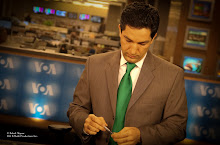Voice of America, PNN
By Siamak Dehghanpour and Babak Gorji
Nov 20 (Washington) – A delegation at the European Parliament which oversees the Iranian affairs, urged Tehran to implement what it calls the Additional Protocol, which permits unrestricted inspections on declared nuclear facilities to search for any possible covert atomic activity.
Relations between Iran and the U.N. nuclear watchdog have become strained in the past years with the Vienna-based agency voicing frustration over what it says is lack of cooperation between the Islamic state and the agency’s inspectors.
The latest report published by the International Atomic Energy Agency (IAEA) further strained Iran's relations with the IAEA and the West so that Iran’s parliament announced it is debating over limiting cooperation with the agency or possible withdrawal from the Non-Proliferation Treaty (NPT).
“Iran should remain in the NPT. It has actually signed the Additional Protocol that gives more rights to inspect Iranian facilities and also gives Iran more guarantees about the accuracy of the IAEA’s gathered information,” Tarja Cronberg, the Finnish head of the Delegation for Relations with Iran at the European Parliament, said in an interview with the Voice of America’s Persian-language Horizon (Ofogh).
The last week’s report of the U.N. nuclear agency assessed that Iran has conducted researches and tests which could improve the Islamic state’s capability to develop nuclear weapons. The report further raised a clamor in Western capitals for harsher sanctions against the clerical regime.
PARALLEL APPROACH
The three prominent delegates warned the Islamic state of increasing international pressures if it refuses to meet its obligations though they stressed on the need of dialogue with Iran as the European Parliament’s parallel approach toward Iran.
“Under the current conditions, we should take the most benefits from every sanction even if they had not already been considered,” said the first vice-chairperson of the Delegation Kurt Lechner confirming his fellow delegation member Cronberg who said the EU supports sanctions but at the same time supports dialogue with Iran.

A senior member of the Delegation for Relations with Iran at the European Parliament Marietje Schaake from Netherlands said in the same TV program that: “we have to be careful not to push the (Iranian) population toward this regime by starting to isolate and even attack on Iran.”
“It is important that those in power in Iran stick to their words and start more cooperating with the international community, so that the worst possible option on the table can be avoided,” Schaake said in an apparent reference to a military option.
The West has long been insisting on a diplomatic solution to clear its concerns about Iran’s nuclear ambitions, but they, as well as Iran’s regional arch-foe Israel, have refused so far to rule out a military action on Iran's nuclear facilities.
“All possible means, other than a military action, should be considered,” said the German delegate Lechner expressing hope to see changes in behavior of Iran’s regime by increasing pressures on Tehran.
Analysts believe a military strike on the world’s fifth biggest oil exporter causes further tensions in the Middle East and in the world’s energy market as Iran has warned that it will respond to any attacks by hitting Israel and U.S. interests in the Persian Gulf.
NEGATIVE IMAGE
The European delegation was scheduled to pay a visit to Iran this month to meet with Iranian officials as well as a group of Iranian activists and Non-Governmental Organizations (NGO) to discuss not only over the disputed nuclear work but also over the human rights situation in the Islamic state. The visit was cancelled after the group’s request for visa was denied by Iranian authorities.
“By denying our requests for visas, it became clear to me that our visit from Iran could be necessary and positive as the hardliners were opposing to such visit,” Lechner said adding that “our meetings with people and civil society in Iran could make Iranian government worried about drawing another negative image of Iran in Europe.”
In October, the U.N. special rapporteur on human rights in Iran Ahmed Shaheed said in a report about an increasing trend of alleged violations of the fundamental rights of the people and stressed the need for greater transparency from the Iranian authorities.
Asking whether the European delegation would plan for another visit to Iran if they ignore a part of their plan to meet with activists, Cronberg replied “It is important for the delegation to meet the parliament and also to meet the NGOs … so this plan is not changing.”
“There is no other plan to visit Iran in near future,” said Lechner adding that the earliest time could be late next year only if the conditions were met.




۱ نظر:
با درود خدمت همۀ دوستان
اصولاً سیاست کشورهای غربی درمورد کشورهای نفت خیز چنین بوده و هست که با روی کار آوردن افراد نالایق وستمگر و ایجاد حکومت استبدادی اکثر افراد میهن پرست را حذف فیزیکی کرده و مابقی را ناتوان و تبعید می کنند و با برچیدن احزاب و روزنامه های آزاد فرهنگ سیاسی مردم را در حد صفر نگه می دارند و ستمگری آنقدر ادامه میابد تا مردم از روی استیصال از حملۀ نظامی به کشور خود استقبال کنند در این مرحله است که کشورهای استثمارگرغربی یاد حقوق بشر می افتند و با آماده سازی افکار عمومی کشورهای خود حملۀ نظامی را شروع می کنند و تمام زیرساختهای اقتصادی و نظامی کشور مورد حمله را منهدم و نابود می کنند و با روی کار آوردن یک حکومت وابسته و ستمگر دیگر ده ها سال شروع به بازسازی و چپاول می کنند و این روند تا خشک شدن چاه های نفت ادامه میابد مگر اینکه این مردم نگون بخت براثر معجزه ای بیدار شوند و با کنار نهادن خرافات و انفعال چشم باز کنند و روند فوق را برهم زنند.
ارسال یک نظر